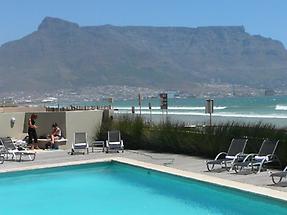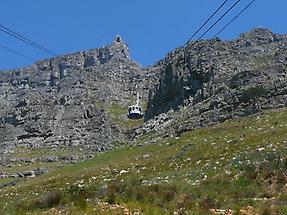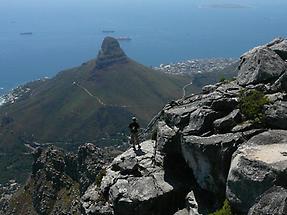Cape Town (Afrikaans: Kaapstad)#
The second largest city in South Africa after Johannesburg is Cape Town (3,74 million people) Kapstadt, Westkap, Südafrika . It is also the provincial capital of the Western Cape, seat of the National Parliament and 10th largest city in Africa. A major part of the inhabitants are immigrants and expatriates, forming one of the most multicultural cities in the world. The most famous and popular landmarks and sights of Cape Town and its surrounding area are the harbour, the Cape floral kingdom, Table Mountain and Cape Point.
Little is known of the first residents living on the shore of Table Bay, since there is no written history. In 1486 the region was first mentioned by the Portuguese explorer Bartolomeu Dias. In the late 16th century Portuguese, French, Danish, Dutch and English ships stopped in the area to trade tobacco, copper and iron with the Khoikhoi, a native pastoralist people of southwestern Africa, in exchange for fresh meat. The first permanent European settlement in South Africa was established in 1652 by Jan van Riebeeck as an outpost and a supply station for Dutch ships sailing to East Africa, India and the Far East.
Soon Cape Town developed into the economic hub of the Cape Colony, in part due to the import of slaves from Indonesia and Madagascar. The Dutch imported many useful plants, like grapes, cereals, ground nuts, potatoes, apples, citrus and many more, thus forever changing the natural environment. At the end of the 17th century and the beginning of the 18th century ownership of the Cape colony changed back and forth between Great Britain and the Netherlands until in 1814 it became permanently a British colony. The Cape got its own parliament in 1854 and a locally accountable Prime Minister in 1872.
By unifying the Cape Colony, Boer Republics and the colony of Natal, Great Britain established the Union of South Africa, with Cape Town as the legislative capital of the Union and later the Republic of South Africa. In the national elections in 1948 the National Party won on a platform of apartheid, a racial segregation, leading to the demolition of multi-racial suburbs and the eviction of its inhabitants.
Cape Town was home to many leaders of the anti-apartheid movement. Probably one of the most famous moments marking the end of apartheid was the speech of Nelson Mandela shortly after his release from prison from the balcony of Cape Town City Hall on 11 February 1990. Four years later, in 1994, the first democratic election in South Africa took place. Since then the city of Cape Town has been struggling with problems such as drugs, a surge in violent drug-related crimes and gang violence. Yet the economic developed very well due to the boom in the tourism and the real estate industries.
 Advertisement in Cape Town
Advertisement in Cape Town Table Mountain (1)
Table Mountain (1) Table Mountain(2)
Table Mountain(2) Table Mountain (3)
Table Mountain (3) Table Mountain (4)
Table Mountain (4) Table Mountain (5)
Table Mountain (5)- Table Mountain (6)
- Table Mountain (7)
- Table Mountain (8)
- V & A Waterfront (1)
- V & A Waterfront (2)
- Cape Town City Hall
- Nelson Mandela
- Castle of Good Hope (1)
- Castle of Good Hope (2)
- Castle of Good Hope (3)
- Castle of Good Hope (4)
- Castle of Good Hope (5)
- Castle of Good Hope (6)
- Castle of Good Hope (6)
- Castle of Good Hope (8)
- Bo-Kaap (1)
- Bo-Kaap (2)
- Bo-Kaap (3)
- St Georges Cathedral (1)
- St Georges Cathedral
- Table Bay (1)
- Table Bay (2)